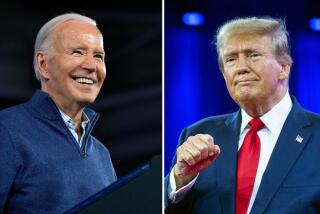Local Leaders Decry Possible Cuts in Census Bureau : Government: Many tell Washington officials that the data is essential to their livelihoods or causes.
Local leaders expressed concern Wednesday that potential budget cuts at the U.S. Census Bureau could damage their ability to secure federal and private funds for social services and hamper their efforts to keep track of the changing local economy.
A diverse group of people, from Latino political organizers to private business people to city planners, took part in a lively “town hall meeting” with senior Washington officials who were in Los Angeles as part of an unprecedented nationwide tour to drum up support for the embattled agency.
The House of Representatives has passed a bill that would slash the Census Bureau’s budget from the $400 million that President Bill Clinton requested to $300 million. The cuts would hit hard at a time when the bureau is starting to gear up for the 2000 census. At the peak of the 10-year census cycle, the budget normally swells to several billion dollars a year.
The city of Los Angeles could be especially hard-hit by the cuts because the region has so many non-English speakers and poor people, who are often hard to reach and tend to be undercounted. With less money, some groups fear that undercounting will worsen.
“I doubt we’ll be able to do anywhere near the level of grass-roots outreach as in the past because of costs,” said Martha Farnsworth Riche, Census Bureau director. However, she said that better promotional efforts and improved statistical techniques will mitigate the effects of the budget cuts.
Lack of census data could also hurt many businesses that rely on the information to form marketing plans, while political organizations will find it harder to conduct their activities without demographic information, users of the data say.
The normally bureaucratic agency is engaging in a public relations blitz to try to save itself. But its task is difficult because its constituency consists of extremely diverse users who have little contact with one another, said Everett Ehrlich, undersecretary for economic affairs at the Department of Commerce, which oversees the agency.
The participants in the meeting at Los Angeles Unified School District headquarters exemplified that diversity. One man said he needed census data for his building supply business, while another woman said she needed the data to secure funding for social services for Asian Americans. In general, the audience was supportive of the Washington officials. Several said they would lobby for increased funding for the census.
Representatives of economic development organizations argued that continued funding of the census is necessary to keep track of the changing economy.
Media representatives said they need high-quality census data for analytical stories on topics such as the effects of affirmative action and urban redevelopment programs.
Rosalind Gold, representing the National Assn. of Latino Elected and Appointed Officials, expressed concern that the bureau’s money-saving move to put data on-line, through the Internet, instead of on paper, makes it less available to grass-roots organizations. Those groups depend on the agency’s printed publications to decide where to allocate resources and to help them apply for public and private grants. Gold’s organization uses census data in its efforts to help legal immigrants become naturalized citizens.
Sally Hoover, a senior planner with the United Way, said her organization uses census data on income and education levels to channel funding where it’s most needed. The Vaughn Family Center in Pacoima, which provides vocational and health services to low-income people, obtained federal and private grants by using census data, she said.
The census results are not just dry statistics to many of those present Wednesday--they are the lifeblood of funding for food, housing and health care.
Los Angeles-area Native American groups made that point by inviting Riche and Ehrlich to lunch at a building on Skid Row next to the place known as “Indian Alley.” In a room usually used to feed homeless people, the Native Americans served the Washington bureaucrats pueblo stew and dried sweet corn after a Kiowan prayer, then argued for better counts of their population.
Many of the Native Americans throughout Los Angeles are not counted by the census, resulting in severe cuts in federal funding, said Glenda Ahhaitty, chairwoman of the American Indian Women’s Leadership Forum. Ahhaitty says there are about 200,000 Native Americans in Los Angeles County, although the census counted only 40,000 in 1990.
Republicans in Congress have been pushing to eliminate the Department of Commerce, which is now in charge of the census, and move the census to the Department of the Treasury or the Department of Labor. Critics of the Commerce Department say it is bloated and outmoded and argue that many of its functions, such as the National Weather Service, should be privatized.
Riche argued that moving the census to the Treasury Department, which runs the Internal Revenue Service, might make people leery of answering census questions.
Rep. Julian C. Dixon (D-Los Angeles), who serves on the subcommittee of the House Appropriations Committee in charge of the Commerce Department, was not available for comment Wednesday.
More to Read
Get the L.A. Times Politics newsletter
Deeply reported insights into legislation, politics and policy from Sacramento, Washington and beyond. In your inbox three times per week.
You may occasionally receive promotional content from the Los Angeles Times.






